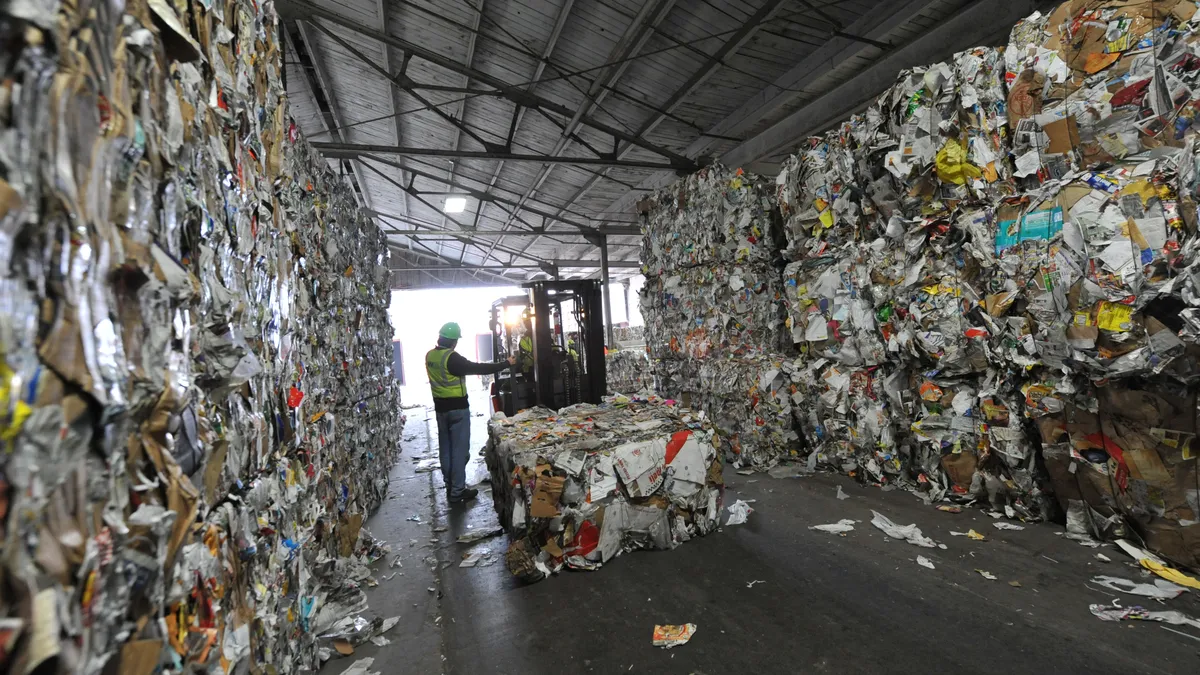Dive Brief:
- WM has completed a $23 million automation upgrade at its Pittsburgh Recycling Facility meant to improve throughput and capture more kinds of plastics.
- The updated facility can now sort several kinds of polypropylene containers and is expected to process up to 25 tons of material per hour, WM said in a news release.
- In April, WM also announced it had completed nearly $39 million in upgrades at a facility in Germantown, Wisconsin. The company also expects to open a new $30 million MRF in Fort Walton Beach, Florida, next month.
Dive Insight:
The MRF projects are all part of WM’s plans to invest over $1 billion in new and upgraded recycling facilities through 2026.
WM expects those investments will add an additional 2.5 million tons of incremental annual processing capacity by the end of 2026, according to a news release. The company had previously estimated the projects would add 2.8 million tons by 2026.
WM sees automation as a major strategy to earn higher premiums for cleaner material. WM aims to increase the amount of recyclables it manages from 15 million to 25 million tons per year by 2030.
Tara Hemmer, WM’s chief sustainability officer, said during a May 6 panel at WasteExpo that the planned retrofits help better position WM to anticipate increased demand for recycled materials in coming years.
“It’s a huge business opportunity for us to invest in the recycling facilities that we can automate and make them more efficient. The material that we capture is cleaner, and there's a lot more capacity that can be unlocked to really help CPG companies that are looking to get that material back,” she said, adding that automation also helps WM more quickly adapt to changes in the material stream.
For the Pittsburgh recycling facility retrofit, the focus was on adding artificial intelligence and optical sorting technology meant to increase throughput and raise quality, said Chris Pilzer, Capitol Area director of sustainable growth, in a statement. Upgrades at the Germantown facility focused on adding optical sorters to help process about 70 tons of material per hour.
Both facilities now have an “intelligent sorting” system that allows conveyors and optical sorters to “communicate with each other and with technicians” to improve material quality, according to WM. Both also have another new optical sorter installed at the end of the line for quality control.
WM previously announced that it plans to finalize 27 automation projects between 2023 and 2025 and expand its recycling footprint into at least eight new locations throughout Florida, Tennessee, Michigan, New York, California, and Oregon, as well as Toronto.
Other facility upgrades in the works include a new recycling facility expected to open next month in Fort Walton Beach, Florida, which is one of WM’s new operating locations. The promise of a new facility, expected to process 120,000 tons per year, was one of the reasons Okaloosa County Commissioners voted to terminate their contract with the Emerald Coast Utilities Authority and enter into a contract with WM to handle recycling in the county, WUWF reported.
WM is also finalizing construction on another new Florida MRF, this one a $75 million project in Pembroke Pines in Broward County.
In 2023, WM announced several other MRF projects, including a new 100,000-square-foot-facility in Cleveland meant to become WM’s primary processing hub in the state.
Disclosure: WasteExpo is run by Informa, the owner of Waste Dive’s publisher, Industry Dive. Informa has no influence over Waste Dive’s coverage.














